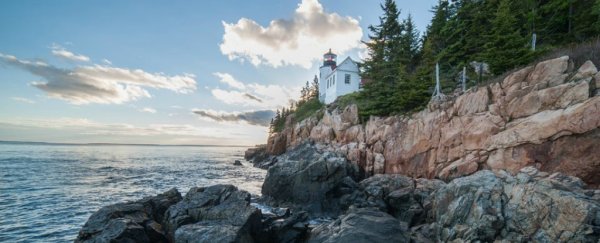A critical study on sea level rise has finally been published by the US National Park Service (NPS) after the agency was accused of violating its scientific integrity policy.
The violation was revealed last month, when the Center for Investigative Reporting's Reveal found that NPS officials had "deleted every mention of humans' role in causing climate change" from the sea level report.
The changes were reportedly made in February of 2018, scrubbing five references to "anthropogenic" climate change and three references to "human activities."
 (Screenshot via Reveal News)
(Screenshot via Reveal News)
After the news prompted an internal investigation, Interior Secretary Ryan Zinke assured Congress that his department was not censoring science.
"I didn't change a paragraph — a comma — in any document and I never would," he said before a House Appropriations subcommittee.
On Friday, thanks to the courage and persistence of the study's authors, the report was quietly published, uncensored and intact. Neither Zinke or the NPS announced the publication.
Environmentalists and science advocates see this as just another example of the Trump administration's denial of human-caused climate change, and their distaste for any science that says otherwise.
The study's lead author, Maria Caffrey, said she is worried that the administrative process at the Department of Interior (DOI) has simply become a means for silencing inconvenient science.
"Censorship is a good word for that," Caffrey, a researcher from the University of Colorado, Boulder, told E&E News. She plans to file a scientific integrity complaint.
"The fight probably destroyed my career with the (National Park Service) but it will be worth it if we can uphold the truth and ensure that scientific integrity of other scientists won't be challenged so easily in the future," Caffrey told Reveal.
Right now, about one-fourth of all national parks sit on or near the ocean, housing diverse ecosystems and precious historic and recreational sites.
With rising seas and the intensification of storms, the study has found some US parks are increasingly at risk of flooding and coastal inundation.
The findings will be crucial in helping America's 118 coastal parks prepare for the effects of climate change.
"Global sea level is rising. While sea levels have been gradually rising since the last glacial maximum approximately 21,000 years ago, anthropogenic climate change has significantly increased the rate of global sea level rise," the study reports.
"Ongoing changes in relative sea levels and the potential for increasing storm surges due to anthropogenic climate change and other factors present challenges to national park managers."
Acknowledging the dangerous effects of climate change, the study concludes that the future of these parks will depend on the world's ability to reduce greenhouse gas emissions.
Nonetheless, Caffrey was told by NPS officials earlier this year that if she resisted the edits or refused to accept the deletions, the paper might be released without naming her at all.
"It's different kinds of bullying and pressure from different people," Caffrey said.
"After awhile it starts to build up, and it becomes an absolute mountain."
Others think Caffrey is making a mountain out of a molehill. A spokesperson from NPS said the study was ultimately delayed because of "discussions between authors over report language" not because of censorship.
"Scientists normally conduct experiments, gather and analyze data, write about and argue conclusions to a point of consensus, often through multiple drafts and usually out of public view," the spokesperson told E&E News.
"The scientists preparing this report were doing just that when working drafts of the report were published in the news media before the authors had completed their deliberations."
However, Caffrey, who has worked at the agency through three different administrations, said she has never experienced a process like this.
"Every administration has its own set of rules," she said.
"Maybe that's going to be the new normal for this administration."
The full study has been published by the US National Park Service.
Science AF is ScienceAlert's new editorial section where we explore society's most complex problems using science, sanity and humor.
